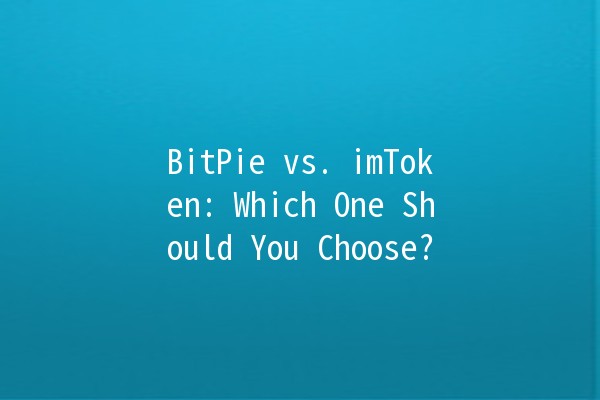
In the rapidly evolving world of cryptocurrencies, choosing the right wallet to store and manage digital assets is essential. Two popular options among users are BitPie and imToken. Both wallets come with unique features, security protocols, and user experiences. In this article, we will delve deep into the comparison of BitPie and imToken, looking at their functionalities, strengths, and weaknesses. By the end, you will have a clearer idea of which wallet may suit your needs best.
Understanding BitPie and imToken
BitPie: A Brief Overview
BitPie Wallet is a cryptocurrency wallet that aims to make it easy for users to manage their digital assets. It offers support for multiple cryptocurrencies, including Bitcoin, Ethereum, and various ERC20 tokens. One of the key selling points of BitPie is its focus on privacy and user security, incorporating several features to help users maintain the confidentiality of their transactions.
imToken: A Brief Overview

imToken is another widely used cryptocurrency wallet, primarily famous for its easytouse interface and robust security features. Like BitPie, it supports multiple cryptocurrencies and is especially popular among Ethereum users due to its compatibility with various decentralized applications (dApps). imToken also offers builtin features like a decentralized exchange (DEX), allowing users to trade tokens without leaving the app.
Features Comparison
MultiCurrency Support
Both wallets support a range of cryptocurrencies, but there are some differences in the specific coins and tokens available. BitPie provides access to multiple networks, including Bitcoin and Ethereum, while imToken has a strong focus on Ethereum and its associated tokens.
User Interface and Experience
The user interface of both wallets is designed to be intuitive. BitPie emphasizes simplicity, making it a great choice for newcomers, while imToken offers more advanced features that appeal to experienced users. imToken facilitates dApp integration, which is a significant advantage for users who are actively engaging in decentralized finance (DeFi) or using other blockchain services.
Security Features
Security is an essential factor when choosing a cryptocurrency wallet. Both BitPie and imToken utilize private key management systems, but they differ in their approach to security:
BitPie: Offers a usercontrolled wallet system where private keys are stored locally, reducing the risk of thirdparty access. The wallet also includes a multisignature feature, enhancing transaction security.
imToken: Employs a hierarchical deterministic (HD) wallet structure, enabling users to generate new addresses without needing to store multiple private keys. The app includes biometric security options, such as fingerprint and face recognition, ensuring that only authorized users can access their wallet.
Transaction Fees
Transaction fees can differ between the two wallets, depending on the cryptocurrency and network conditions. Generally, both wallets aim to keep fees competitive. However, imToken’s builtin DEX may incur additional costs depending on the tokens being traded.
Productivity Enhancement Tips
While managing cryptocurrencies through BitPie and imToken, enhancing your productivity can lead to better decisions and outcomes. Here are five practical tips to help streamline your digital asset management:
Description: Set up price alerts and notifications for transactions. Both wallets offer features to keep you informed about market movements.
Implementation: Use inapp settings to activate alerts for significant price changes or transaction confirmations.
Description: Keep track of different assets and categorize them based on your investment strategy.
Implementation: Use the tagging features in imToken to label your assets, or create notes in BitPie regarding each asset’s purpose or strategy.
Description: Access decentralized applications directly through imToken to enhance your trading and investment strategies.
Implementation: Regularly explore new DApps within the app that can offer additional insights or trading capabilities.
Description: Set a calendar reminder to review your cryptocurrency portfolio periodically, assessing performance and making adjustments.
Implementation: Use your phone’s reminder app to schedule reviews, ensuring you stay on top of changes in the market.
Description: Follow cryptocurrency news and trends to make informed decisions about your investments.
Implementation: Subscribe to credible news sources and podcasts focusing on blockchain and cryptocurrency developments.
Frequently Asked Questions
Both wallets offer robust security features; however, the level of user control over private keys in BitPie may provide an added layer of security. imToken’s biometric features also enhance security, making it a strong option. Ultimately, the security of each wallet depends on user practices as well.
imToken allows direct access to a variety of dApps, providing users with a seamless experience. BitPie does not focus heavily on dApp integration, so if using decentralized applications is vital for you, imToken would be the better choice.
Both wallets support a decent range of cryptocurrencies. If you hold a variety of digital assets, the wallet that offers the best support for those specific tokens should be your priority. Ensure to check for token compatibility before deciding.
Transaction fees vary based on network conditions rather than the wallets themselves. Generally, both BitPie and imToken offer competitive fees, though imToken’s DEX features might incorporate additional charges based on trading volume.
For beginners, BitPie may offer a more straightforward, userfriendly experience. imToken, while more powerful, also comes with advanced features that might overwhelm new users.
Both wallets provide backup options. Always ensure to store your recovery phrases, and follow the display instructions carefully to ensure you can access your wallet in case of device loss or failure.
In the world of cryptocurrency wallets, both BitPie and imToken bring unique features to the table. Your choice depends on your specific needs, whether you value security, ease of use, or features like DApp access. Analyze your preferences and consider the scalability of each wallet as you embark on your cryptocurrency journey. Remember to conduct your due diligence and continuously educate yourself to make informed decisions in this everchanging landscape.

